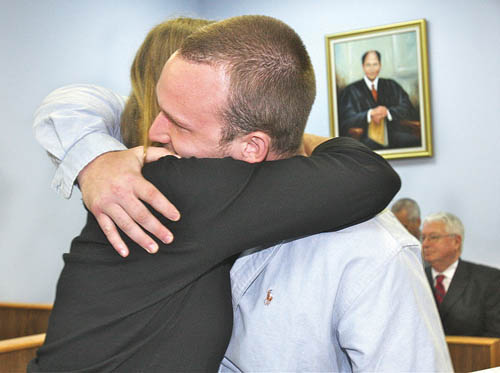Feature: Thanks to ‘drug court,’ they’re now sober

Three years ago, 25-year-old Jamie Kae White of Southampton was pushed out of a moving car in East Marion and suffered a serious brain injury.
She spent six weeks in a medically induced coma, had part of her skull removed and replaced and then spent six months recovering in the hospital.
After her release, she was prescribed pain medication. And, she says, she became addicted to it.
But after about a year, the prescription ran out.
“I got addicted to pain medication and when I couldn’t get anymore, I was doing it my way,” Ms. White said in an interview Friday.
“I was using pot and buying other kinds of pills.”
She eventually started using cocaine, ecstasy, marijuana, alcohol and a number of different types of pills to alleviate the pain. Ultimately, she got caught.
But things have worked out well for Ms. White. Two weeks back, she graduated from the East End Regional Intervention Court, commonly called “drug court.”
“I’ve been drug- and alcohol-free for a year and three months now,” she said. “It was hard, but I had a lot of support and a lot of people who cared for me.”
She said she no longer associates with people who drink or do drugs.
“I cut out all people who drink,” she said. “I only hang out with sober people now. I’m going to keep moving forward.”
The court, now in its ninth year, is available to nonviolent offenders over age 16 who face drug-related charges in East End courts.
They must enter a guilty plea and sign a contract that details the requirements for their participation and describes their alternate sentence, often jail, that will apply if they pull out of the program or don’t comply.
Working with local judges, prosecutors, drug counselors and others, the drug court aims to treat defendants’ addiction problems, rather than simply punish them.
Riverhead Town Justice Allen Smith and Southampton Town Justice Deborah Kooperstein administer the drug court. Southold Town Justice William Price and Shelter Island Justice Helen Rubenstein also participate. All of the cases are heard in either Riverhead or Southampton town justice courts.
Ms. White and 21-year-old Maxwell Irwin, also of Southampton, both completed the program and graduated on Friday. Sixteen other drug court participants graduated in May.
One of those graduates was Megan Dalene of East Hampton, who discovered when she was in drug court that she was pregnant. Today, she has a 7-month-old baby, Brady, and is “clean and sober,” reversing years of addiction.
“I started drinking when I was 14 and it escalated to smoking weed and then, from there, I just started doing more drugs,” Ms. Dalene said in an interview Friday.
She started to get in trouble and had a couple of driving while intoxicated arrests, and eventually agreed to participate in drug court.
“I realized I needed to changed my life,” she said.
While she had started with just alcohol and marijuana, she eventually ended up doing cocaine and opiates as well, she said.
“I’m really thankful for the drug court and that they believed in me and provided a program to help me get sober and stay clean,” Ms. Dalene said. “Without the drug court, I don’t think I would have done so.”
Ms. Dalene attended Friday’s drug court graduation in Riverhead Town court with Brady.
Mr. Irwin said he started smoking pot and drinking with his friends shortly after his mother died when he was 13.
“I started hanging out with my friends at my house all the time while my dad was away at work,” he said.
Mr. Irwin, who played lacrosse in high school, said he even “sold a little pot” to get lunch money in school.
While in the drug court program, he lived for a while at Phoenix House, a drug rehab clinic in Hauppauge, where he met some friends who got him interested in going to the gym and working out. Now, he says, he focuses his efforts there, instead of getting high.
“I push people to get in the gym with me. I’ve been working out in the gym for more than a year,” Mr. Irwin said, adding that he has continued to hang out with the people he met at Phoenix House.
He thanked the members of the drug court Friday.
“They helped me to become a productive member of society,” Mr. Irwin said.








